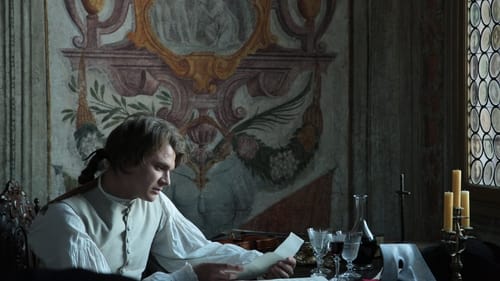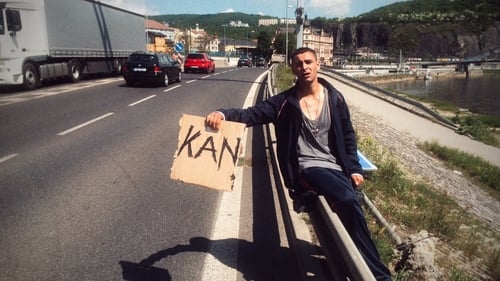
Writer
1764. Durante más de un año, Josef ha llevado una vida precaria en Venecia. Aspira a ser compositor de ópera. La ciudad, llena de autores con talento y ya consolidados, parece cerrada para él. Buscando trabajo como violinista, entra en la órbita de una joven adinerada. Gracias a ella tiene la oportunidad de tocar en salones. Pero su verdadera oportunidad surge cuando se convierte en el amante de una marquesa libertina. Ella le enseña modales sofisticados, le libra de los trazos de su origen provinciano y le introduce en una existencia hedonista libre de intolerancia religiosa. Transformado, Josef recibe un increíble encargo: escribir una ópera para el San Carlo, el teatro más grande de Europa.

Director
1764. Durante más de un año, Josef ha llevado una vida precaria en Venecia. Aspira a ser compositor de ópera. La ciudad, llena de autores con talento y ya consolidados, parece cerrada para él. Buscando trabajo como violinista, entra en la órbita de una joven adinerada. Gracias a ella tiene la oportunidad de tocar en salones. Pero su verdadera oportunidad surge cuando se convierte en el amante de una marquesa libertina. Ella le enseña modales sofisticados, le libra de los trazos de su origen provinciano y le introduce en una existencia hedonista libre de intolerancia religiosa. Transformado, Josef recibe un increíble encargo: escribir una ópera para el San Carlo, el teatro más grande de Europa.

Camera Operator

Screenplay

Director

Screenplay
En algún lugar en el medio de la nada en las provincias checas, un puñado de personas se juntan: un guardia paranoico de la prisión, su vecino hipocondríaco y la esposa silenciosa y desesperada de este, un gerente de club nocturno enamorado y una stripper que es madre soltera.

Director
En algún lugar en el medio de la nada en las provincias checas, un puñado de personas se juntan: un guardia paranoico de la prisión, su vecino hipocondríaco y la esposa silenciosa y desesperada de este, un gerente de club nocturno enamorado y una stripper que es madre soltera.

Screenplay
The film follows the staging of the opera Olimpiade while at the same time exploring the dramatic life of its composer Josef Mysliveček, a friend and teacher of W. A. Mozart.

Idea
The film follows the staging of the opera Olimpiade while at the same time exploring the dramatic life of its composer Josef Mysliveček, a friend and teacher of W. A. Mozart.

Director
The film follows the staging of the opera Olimpiade while at the same time exploring the dramatic life of its composer Josef Mysliveček, a friend and teacher of W. A. Mozart.

Screenplay
The Way Out tells a story of a young Romani couple, Zaneta and David, the parents of little Janicka. Their efforts to live a decent and dignified life run up against the "Romani social trap," which is racism, the society's prejudices, exclusion from opportunities to obtain legal work, the lack of necessary qualifications, difficult communication with officials, debts and the miserable life conditions connected with the environment, lifestyle and traditional values of their ethnicity. David wants to protect his family, even at the expense of committing a crime. But Zaneta finds inner strength to defy the unfavorable situation in a different way. Will they overcome the existential problems that start to take apart their relationship? Is it worthwhile for them to continue to Honor their own values and family traditions? And will their "way out" be only another "escape" for them, or a promise to change their lives?

Director
The Way Out tells a story of a young Romani couple, Zaneta and David, the parents of little Janicka. Their efforts to live a decent and dignified life run up against the "Romani social trap," which is racism, the society's prejudices, exclusion from opportunities to obtain legal work, the lack of necessary qualifications, difficult communication with officials, debts and the miserable life conditions connected with the environment, lifestyle and traditional values of their ethnicity. David wants to protect his family, even at the expense of committing a crime. But Zaneta finds inner strength to defy the unfavorable situation in a different way. Will they overcome the existential problems that start to take apart their relationship? Is it worthwhile for them to continue to Honor their own values and family traditions? And will their "way out" be only another "escape" for them, or a promise to change their lives?

Himself
Ester Krumbachová - a costume designer, screenwriter, director; one of the boldest personalities of the Czech New Wave. She worked in theatre, she was a writer and an illustrator. She co-created films such as O slavnosti a hostech (1966), Sedmikrásky (1966), Vsichni dobrí rodáci (1969), Pension pro svobodné pány (1968), Valerie a týden divu (1970), Slamený klobouk (1972) and many others. In the 1960s, she was a 'pivot' of the art scene in Prague, attracting artists who were on the threshold of their career, just setting out to find their own form of self-realization. Those who underwent her tutelage remember her forever. Director Vera Chytilová talks to those who knew Ester Krumbachová, who worked with her, befriended her, loved her. She sets off on a search that is to end by answering the question: Who was Ester?

Screenplay
Krystof, an architect whose main priority is his job, has been living for several years with Tereza, who has a somewhat different outlook on life. Their love story reveals the distinctness and contradictory nature of each person's subjective worlds and shows how the line between dream and reality differs in each and every one of us.

Director
Krystof, an architect whose main priority is his job, has been living for several years with Tereza, who has a somewhat different outlook on life. Their love story reveals the distinctness and contradictory nature of each person's subjective worlds and shows how the line between dream and reality differs in each and every one of us.

Writer
Told via flashback, this raw, emotional drama chronicles the events that led a 22-year-old Czech Gypsy to prison. Marian was born to an alcoholic father and a terrible mother. As a result he is sent to a government orphanage where he is labelled a problem child for his inability to speak Czech. Life in the orphanage is devoid of love and offers only minimal physical comforts. Sometimes life there is brutal. His one bright spot was the time he first spent with a kindly and encouraging teacher who inspired in him hope for a better future. One day something goes wrong and the teacher is forced to punish Marian who retaliates by stabbing her. Marian is a teen by the time he is released from a juvenile reformatory. He falls in love for the first time, but because it is a foreign emotion, he doesn't know how to deal with it. By this time, the cruelty that has marked his life in institutions seems to have fated him to be a criminal and for Marian there can be no turning back.

Director
Told via flashback, this raw, emotional drama chronicles the events that led a 22-year-old Czech Gypsy to prison. Marian was born to an alcoholic father and a terrible mother. As a result he is sent to a government orphanage where he is labelled a problem child for his inability to speak Czech. Life in the orphanage is devoid of love and offers only minimal physical comforts. Sometimes life there is brutal. His one bright spot was the time he first spent with a kindly and encouraging teacher who inspired in him hope for a better future. One day something goes wrong and the teacher is forced to punish Marian who retaliates by stabbing her. Marian is a teen by the time he is released from a juvenile reformatory. He falls in love for the first time, but because it is a foreign emotion, he doesn't know how to deal with it. By this time, the cruelty that has marked his life in institutions seems to have fated him to be a criminal and for Marian there can be no turning back.

Writer
Petr Vaclav's documentary Pani Le Murie (Madam Le Murie, 1993) depicts the last survivor of an aristocratic family who refused to bow to Communism.

Director
Petr Vaclav's documentary Pani Le Murie (Madam Le Murie, 1993) depicts the last survivor of an aristocratic family who refused to bow to Communism.














